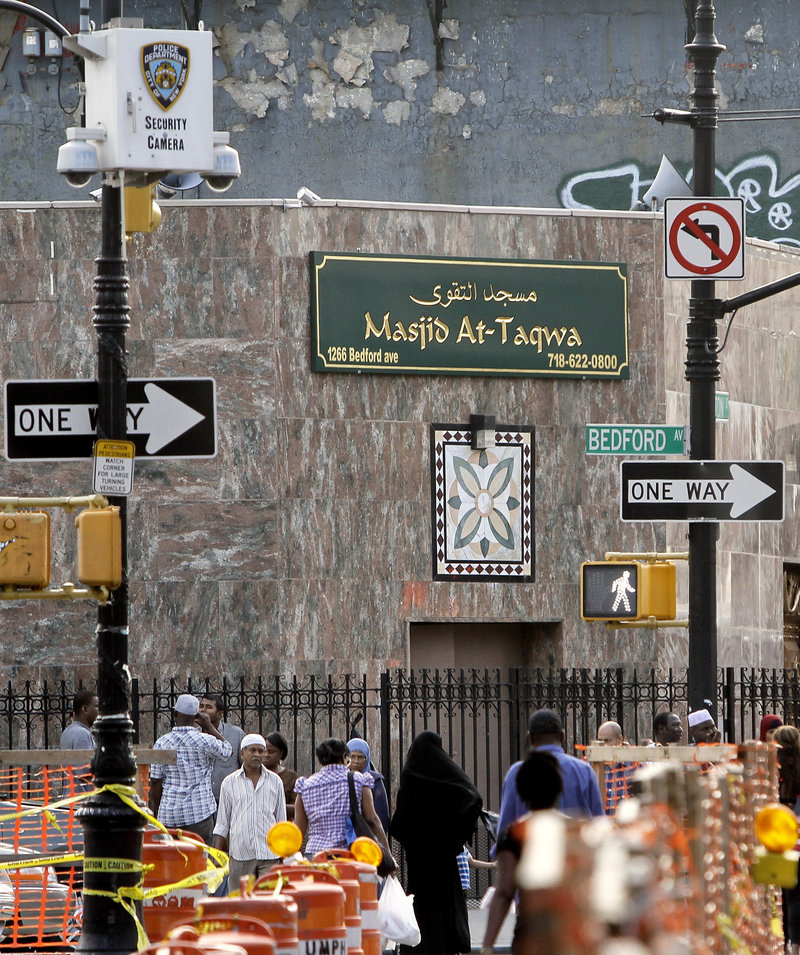WASHINGTON – Civil rights lawyers on Monday raised the first opposition to New York Police Department efforts to spy on Muslims, an operation that politicians have been reluctant to even discuss.
The lawyers asked a federal judge in Manhattan to force the NYPD to turn over records about clandestine police programs that monitored all aspects of daily life in Muslim neighborhoods. The request represents the first official action against the NYPD since The Associated Press revealed how the police intelligence programs operate.
A small number of Capitol Hill and New York lawmakers have called for greater oversight and controls over the police department’s intelligence unit. But most in politics, including President Obama, have shown no interest in even talking about what the NYPD is doing, much less saying whether they support it.
That reluctance shows how, a decade after the attacks of Sept. 11, 2001, the nation still isn’t sure how it wants police to prevent terrorism. Despite speeches, policy papers and press releases about cooperating with Muslim communities, most politicians see only political risk in speaking for or against programs that singled out Muslims for investigations aimed at preventing another attack.
In speeches, Obama has spoken out against casting suspicion on Muslims. He has equated discrimination against Muslims with the racial inequities that led to the civil rights era. Obama also has said that the war against terrorism must not be seen as a war against Islam.
Obama has been silent, however, about whether he supports the NYPD surveillance programs that, as the AP’s investigation revealed, used plainclothes officers to eavesdrop inside businesses. Restaurants serving Muslims were identified and photographed. Hundreds of mosques were investigated. Dozens were infiltrated. Police also maintained a list of 28 countries that, along with “American Black Muslim,” were labeled “ancestries of interest.”
Such programs were built with help from the CIA, which sent a veteran officer to New York to help oversee the efforts and which allowed an NYPD detective to complete its espionage course. One of the agency’s most senior clandestine operatives recently moved to the NYPD to work inside the department’s intelligence ranks.
In an interview with the AP, Obama’s counterterrorism adviser, John Brennan, called the NYPD’s efforts heroic, but the White House said afterward that he was not endorsing its programs. He was not denouncing them, either.
Homeland Security Secretary Janet Napolitano, whose agency spends hundreds of millions of dollars a year on the NYPD, and the assistant attorney general for civil rights, Thomas Perez, similarly sidestepped questions about the programs.
The court documents filed Monday were part of a decades-old class-action lawsuit against the NYPD for spying on war protesters and activists. Since 1985, a court order has limited how the department can monitor activities protected by the First Amendment. Police are not allowed to collect and store information about innocent people that is not related to criminal or terrorist activity.
“Based on this evidence, there is reason to believe that the NYPD retains records of surveillance of public places that are not limited to information pertaining to ‘potential unlawful activity or terrorism,’” lawyers told U.S. District Judge Charles Haight on Monday.
Documents obtained by the AP show a secret team known as the Demographics Unit was instructed to canvass neighborhoods looking for businesses catering to one ethnic group, Moroccans. The documents indicated plans to build databases for other ethnic groups showing where they eat, work, pray and shop.
“These reports raise questions that don’t lend themselves to easy answers,” said Sen. Susan Collins of Maine, the top Republican on the Senate Homeland Security Committee. “We want our police departments — especially those in New York, which has been repeatedly targeted by terrorists — to identify emerging threats before they develop into full-fledged attacks. At the same time, law enforcement must build trust with the communities they serve by scrupulously respecting civil liberties and constitutional rights.”
Send questions/comments to the editors.



Success. Please wait for the page to reload. If the page does not reload within 5 seconds, please refresh the page.
Enter your email and password to access comments.
Hi, to comment on stories you must . This profile is in addition to your subscription and website login.
Already have a commenting profile? .
Invalid username/password.
Please check your email to confirm and complete your registration.
Only subscribers are eligible to post comments. Please subscribe or login first for digital access. Here’s why.
Use the form below to reset your password. When you've submitted your account email, we will send an email with a reset code.